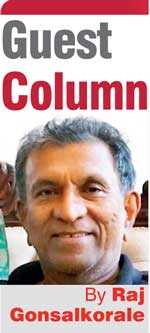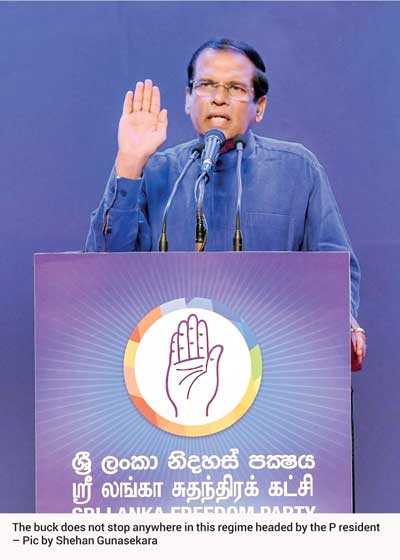Thursday Feb 19, 2026
Thursday Feb 19, 2026
Thursday, 26 September 2019 01:02 - - {{hitsCtrl.values.hits}}
The defeat of the Rajapaksa regime in 2015 may have been due to several factors.
Firstly, despite a lot of good work done, including ending a 30 year Armed conflict, they dug their own graves. They will or should know how they did this. Secondly, a huge amount of funds was thrown in to oust the regime, including funds from foreign governments.
The going prices for politicians to switch sides rose exponentially, and the effect of this is felt to this day. The purchase prices of politicians rose considerably, and the return on investments by politicians for their own financial well-being gave them very good yields at public expense. They began prostituting this noble public duty to the highest bidder. Some who rode bicycles into Parliament began leaving it in Maseratis, well, virtually.
Despite the accumulation of wealth by politicians and those near and dear to them, they have always been outside the radar of the Tax Department while someone who has underpaid tax by Rs. 10,000 or so is hounded. The lavish lifestyle of many politicians, certainly not all, is an affront to human decency. Yet, this lavishness goes on unabated. The opulence of a recent wedding celebrations of a leading politician’s son was evidence of this lavishness. 
Unsavoury and undemocratic practices
The defeat of the previous regime in 2015 heralded some unsavoury and undemocratic practices. The new President sacked the then Prime Minister, who still had a majority in Parliament and appointed someone who didn’t. The President split his own party in pursuit of the regime change, and the crown.
The General Election that followed saw the UNP emerging as the largest party in Parliament. Rather than asking the leader of that party to form a government, the President stitched together a coalition of what eventually has turned out to be a coalition of the unwilling, a disaster for the country. A bull and a buffalo trying to plough a field.
The desire to rid the country of corruption being the prime motive to oust the previous regime has become a sad joke as corruption has sky rocketed under the present regime. The robbery of the Central Bank is testimony to this.
The President’s destructive tactics showed the unconstitutional sacking of his Prime Minister and then the withdrawal of his party from the coalition of the unwilling.
Then came the Easter Sunday bombings, something that could have been avoided and the lives of some 300 people spared.
The buck does not stop anywhere
The slightly amended version of the three monkey syndrome of “I didn’t hear, I didn’t see, therefore I didn’t act” is the answer to those who died, and the answer to the serious economic set back the country has faced as a consequence. The Head of State continues with his Teflon attire.
This demonstrated that the buck does not stop anywhere in this regime headed by the President. Many responsible people including the former Army Commander turned politician Sarath Fonseka has stated otherwise and that it was more a case of “I didn’t see or hear because I was fast asleep, and I didn’t act because I was asleep.”
The responsibility for that human and economic disaster cannot be placed entirely at the feet of the President although the buck should have stopped with him. The Security Council did not comprise of only the President. Surely, whatever information provided to it by the relevant agencies, particularly the build-up of events which ultimately led to the disaster should have alerted every other person who happened to be sitting at successive Security Council meetings unless they too were asleep.
Whatever the reason, and whoever was present or not present, there is only one President in the country and the buck has to stop there. That is why there is a President. In this case, the trust placed in the Head of State and Minister of Defence was not upheld and the responsibility was absconded. 
Serious deterioration
The last four years have witnessed a serious deterioration of societal values, and if one wishes to say they had already deteriorated by the time the regime took over, then one could say this regime has failed to arrest that deterioration and the country is in a worse situation than before.
The economy has floundered and economic growth has dropped to less than 2.5% according to the Central Bank. It was around 7% in 2015 when this regime took over. Economic management has been the responsibility of the Prime Minister during the last four years. He must take responsibility for its mismanagement, and not tell the country and the world that the fault lay elsewhere and had nothing to do with him. The economy buck should have stopped with him.
Corruption has never been higher and if things were bad in 2015, they are far worse now. Credibility and the regard for the high offices have sunk to an all-time low. The President epitomised this by indirectly (some say directly) accusing a foreign government (by implication as the entity accused was a government entity) recently for misappropriating a large sum of money at the opening ceremony of a landmark building in the country funded primarily by an entity of that government. Questions are being asked why this was not raised earlier and why an investigation was not launched if there was any suspicion of wrong doings.
This in addition to the timing and the belated request for extradition of the former Governor of the Central Bank to get answers in regard to the Central Bank scam, has raised questions whether these acts are those of a statesman or a politician who has an objective of trying to get what he wants irrespective of the cost of such tactics.
The people of the country should be the judges and they should ask themselves whether the two highest office holders in the country should have the cheek to go around pretending the demise of the country is someone else’s fault and they had nothing to do with the perilous situation the country has been placed in under their watch. They should ask themselves whether the word “shame” has been removed from the dictionary. They should ask themselves whether these two highest office holders deserve another chance or whether they should be consigned to history.
Time for new leadership and drastic change
Sri Lanka needs a new leadership and a drastic change in the way leaders repose the confidence placed in them by the people. If the rot that has set in is not arrested, the smell of putrefaction will become unbearable, and it may be too late to arrest what might become of this once resplendent island. The rejection of the current leadership does not automatically mean the country should have the old wine in new bottles. There should be new wine, new thinking and new values. If the previous regime wishes to make a comeback, people should ask them what they would do differently to the current leadership and what they would do differently to what they did when they were in power. Whether it has been proven or not, the smell of corrupt activities, authoritarian practices and unlawful activity seemed to emanate strongly amongst the good deeds done for the country by the previous regime. They need to show how they would cleanse the air.
Strict independence of the Judiciary and non-interference in law and order activity must be uppermost in the list of priorities. The law should apply equally and fairly for everyone. No one, including the President of the country, should be above the law.
An economic development plan must flood the grass roots with opportunities for a better quality of life for them and their children, and not just the top of the pile who have got richer while the majority of people have barely been able to keep their heads above their shoulders. The security of the country too is paramount as without that assurance, Sri Lankans will not be safe, and Sri Lankans will not be able to attract foreign investment to develop the economy.
All serious presidential hopefuls must tell the public how they would bring hope to a country now in a hopeless situation. The last thing they would wish is for an emperor without clothes to get the rest of the country also to parade without clothes.